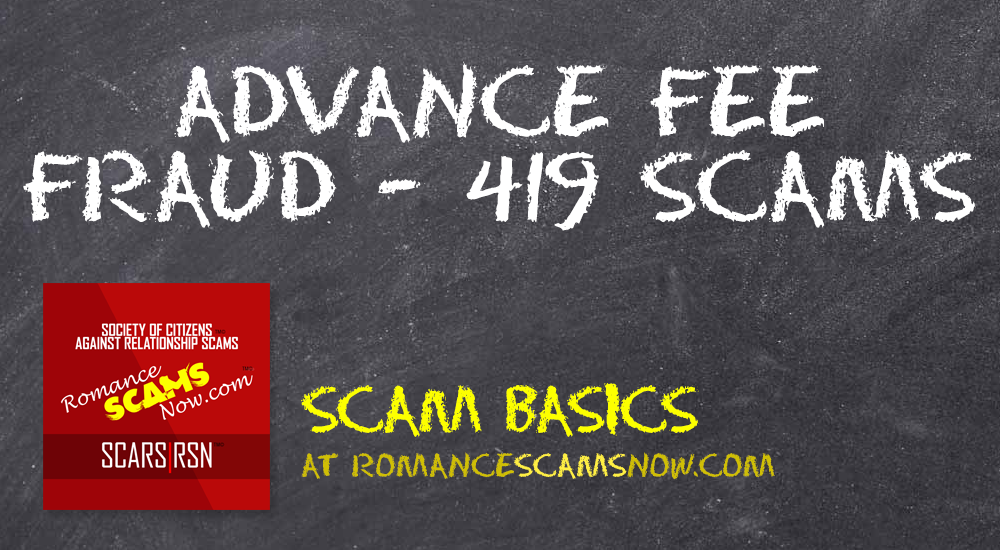What Is An Advance Fee Fraud
An advance-fee scam is a form of fraud and one of the most common types of online scams or cybercrimes.
The scam typically involves promising the victim a significant share of a large sum of money, in return for a small up-front payment, which the fraudster requires in order to obtain the large sum.
If a victim makes the payment, the fraudster either invents a series of further fees for the victim or simply disappears.
The Federal Bureau Of Investigation [FBI] States That:
An advance fee scheme occurs when the victim pays money to someone in anticipation of receiving something of greater value—such as a loan, contract, investment, or gift—and then receives little or nothing in return.
There are many variations of this type of scam, including the 419 scam (also known as the Nigerian Prince scam), the Spanish Prisoner scam, the black money scam, Fifo’s Fraud and the Detroit-Buffalo scam.
The scam has been used for decades with fax and traditional mail, and is now prevalent online in emails and instant messages, even with SMS Text messages.
While Nigeria is most often the nation referred to in these scams, they originate in other nations as well. In 2006, 61% of internet criminals were traced to locations in the United States, while 16% were traced to the United Kingdom, and 6% to Nigeria. However, that was 13 years ago, and today Advance Fee frauds come from almost every country as more learn how they work and just how many victims will bite.
Other nations known to have a high incidence of advance-fee fraud include:
- Ivory Coast
- Togo
- South Africa
- The Netherlands
- Spain
- Poland
- Jamaica
- China
- Vietnam
- India
- Pakistan
- Bangladesh
- Latin Americas
The number “419” refers to the section of the Nigerian Criminal Code dealing with fraud, the charges and penalties for offenders.
According to Western Union:
The victim sends money to the scammer using a money transfer service, but then receives nothing in return. These loans, credit cards, grants, investments or inheritance sums never actually existed.
And once the scammers get their money, they are never heard from again. These types of advanced fee or prepayment scams often prey on those who are struggling financially, but that doesn’t mean they can’t happen to anyone.
They Come In Many Forms
Phony offers don’t just come through email and over the Internet; you might receive a letter in the mail offering you an opportunity. Another prominent scam may be initiated by someone claiming to be a person of importance in a foreign country who needs your assistance in accessing funds in their country, tricking consumers into thinking their request is legitimate. The fraudsters are very convincing.
Tips To Avoid Advance Fee Fraud
1) NEVER SEND MONEY TO SOMEONE YOU HAVEN’T MET IN PERSON
Make sure you know exactly who you’re dealing with when using a money transfer service.
While money transfer is a great way to send money to family and friends, it should not be used for sending money in advance for a credit card or loan fee. If you’ve never heard of the company or person contacting you, do a little research to learn more about them. If possible, plan a visit to the business location or consult the Better Business Bureau. If you have significant concerns, contact your Attorney General’s Office or your local law enforcement officials.
REMEMBER: Money Transfer services will ask you if you know this person – sadly most victims lie about this and say they do. Did you know that that simple act is a crime? It is wire fraud and potential money laundering.
2) NEVER HAVE TO SEND MONEY IN ADVANCE TO OBTAIN A LOAN OR CREDIT CARD
Keep in mind: if an offer appears too good to be true, it most likely is.
You should not pay money to someone for a promise or in anticipation of receiving something of greater value. If you receive a suspicious email that mentions a money transfer organization, be sure to notify the organization and report the email right away. If someone contacted you through email asking you to send them money via Western Union, forward the email to: spoof@westernunion.com » and report it on this website or on Anyscam.com »
3) DO NOT PAY FOR AN ITEM OR SERVICE WITH A MONEY TRANSFER TO AN INDIVIDUAL
When purchasing an item on the internet, be sure you’re using a secure payment method.
It’s never a good idea to send money to an individual to pay for an internet item or service via money transfer. When sending money in any case, you should be aware of exactly where it’s headed.
4) BE SUSPICIOUS OF BUSINESSES WITHOUT A VERIFIED STREET ADDRESS
If the business you’re buying products from operates out of a post office box or mail drop, you should be suspicious.
Additionally, any ecommerce or sales company without a direct telephone line or who is never available when you call is a red flag that should make you think twice.
Summary
Follow these tips to keep your money where it belongs: in your wallet.
How To Report Fraud To Western Union
If you believe you may be a victim of fraud using Western Union, call the Western Union Fraud Hotline number at 1-800-448-1492.
How To Report Fraud To MoneyGram
If you suspect fraud on a transaction that has not yet been received, please contact MoneyGram’s Customer Care Center at (800) 926-9400 (in Spanish – (800) 955-7777) in order to have the transaction canceled immediately.









![An Example of How Scammers Use Emergency Scams - 2014 [UPDATED 2024] - on SCARS RomanceScamsNOW.com](https://romancescamsnow.com/wp-content/uploads/2014/06/emergency-scams.png)

Please Leave A Comment - Tell Us What You Think About This!